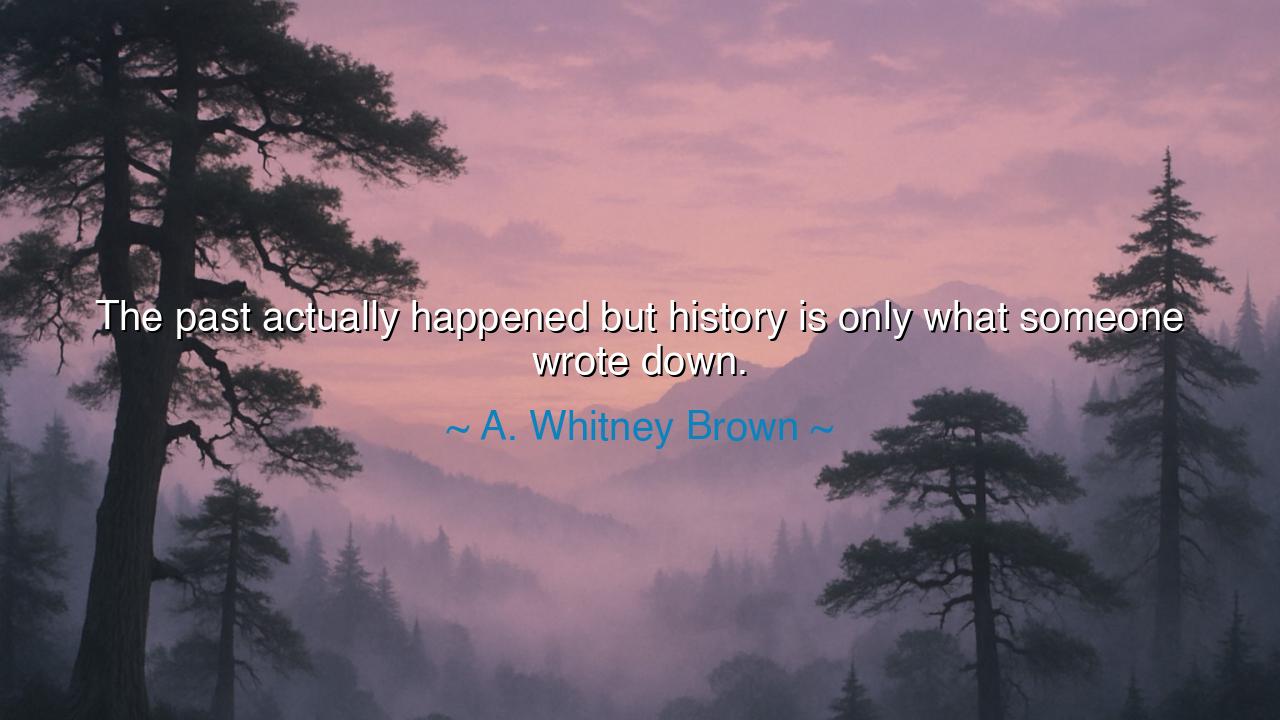
The past actually happened but history is only what someone wrote






The satirist and thinker A. Whitney Brown once spoke a truth that pierces through the illusions of certainty: “The past actually happened, but history is only what someone wrote down.” Within this simple observation lies a profound understanding of how fragile and selective our memory of the world truly is. The past — the realm of events, of moments lived and gone — is vast, infinite, and complete. But history, the record of that past, is narrow, filtered through the eyes, the hands, and the intentions of those who chose to tell it. In those few words, Brown reminds us that truth, when captured by man, becomes story — and that the way a story is told may shape the destiny of nations.
To say that “the past actually happened” is to acknowledge the unchangeable nature of reality. The wars, the revolutions, the loves, and the losses — all these things unfolded as they did. They are the stones of time. Yet what we call “history” is only the shadow those stones cast through the lens of human remembrance. Every record, every chronicle, every textbook is a voice — and every voice has its bias, its purpose, its omissions. Some stories are written to glorify, others to condemn. Some voices are amplified, while others are silenced. Thus, history is not the past itself, but an interpretation of it, shaped by those with the power to write and preserve.
Consider the example of Cleopatra, the last queen of Egypt. To the Romans who conquered her, she was painted as a seductress, a manipulator, a threat to empire. To her own people, she was a ruler of wisdom and courage who sought to preserve her nation’s dignity against the rising tide of imperial power. Both accounts cannot be wholly true, yet both live as “history.” The truth of Cleopatra’s past — the real woman, the beating heart behind the legend — is lost to time. What remains is what someone wrote down, shaped by political need, cultural prejudice, and the storytelling of victors. Thus, what we inherit as history is not the pure mirror of the past, but a reflection distorted by power and perception.
This pattern echoes across all civilizations. The victor writes history, while the defeated vanish into silence. The ancient libraries that burned — at Alexandria, at Baghdad, at countless forgotten places — remind us that for every story that survived, a hundred more were lost. Whole peoples, entire ways of thinking, were erased because no one wrote their truth, or because their writings were destroyed. The past remains unchanged, but our understanding of it shifts like sand, reshaped by every hand that writes, edits, or interprets. Brown’s quote, though tinged with irony, speaks with the gravity of prophecy: that those who control the telling of history control the memory of mankind.
Yet within this realization lies both warning and hope. The warning is clear: do not accept history as unquestioned truth. The lesson of A. Whitney Brown is that we must approach the written record with humility and curiosity, knowing it is a fragment, not a whole. Every chronicle has a silence, every account has an unseen other side. The hope, however, lies in our power to seek those lost voices — to read critically, to listen beyond the page, to restore balance where history has been unjust. In doing so, we do not change the past, but we draw closer to the truth of what it truly meant.
In our own time, the meaning of this quote grows even more urgent. We live in an age of information, where words travel faster than wisdom. Every event is recorded, but not always truthfully. The line between “what happened” and “what is said to have happened” grows thin. Thus, we are all now the writers of history — each tweet, each article, each photograph a thread in the tapestry of collective memory. To live wisely, we must wield this power with integrity. The ancients taught that speech itself was sacred, that the scribe bore moral responsibility for what he inscribed upon the scroll. So must we, in our age, learn again to respect the truth we record.
Therefore, my listener of the future, take these words as counsel: seek not only to remember, but to understand. When you study history, ask who wrote it, and why. When you tell your own story, tell it honestly, for one day it may be all that remains of what truly happened. Let your pursuit of truth be humble, for even the wisest mind can see only a fragment of the past. Yet let it also be courageous — for through the act of seeking, we give voice to those forgotten by time.
For the past is eternal, and cannot be changed. But history, being written by mortal hands, is alive — it can be corrected, expanded, redeemed. And in that sacred work of remembering rightly, we fulfill our highest calling: to give truth a second life. As A. Whitney Brown reminds us, the past belongs to time, but history belongs to us — and it is our duty to write it with both honesty and heart.






AAdministratorAdministrator
Welcome, honored guests. Please leave a comment, we will respond soon